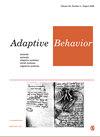Beyond boundaries: The present and future of 4E cognitive science in interdisciplinary academia, industry, and everyday life
IF 1.3
4区 计算机科学
Q4 COMPUTER SCIENCE, ARTIFICIAL INTELLIGENCE
引用次数: 0
Abstract
What gives a scientific framework a place among laypeople? Can cognitive science change human livelihood? How can cognitive science research extend beyond the bounds of its own field to change academia and society? These are precisely the kinds of questions the 2022 Workshop on “Challenges in 4E Cognition and the Opportunities They Present” sought to address. The workshop gathered an interdisciplinary cohort of researchers from philosophy, psychology, cognitive science, neuroscience, and artificial intelligence to discuss the future of 4E (embodied, embedded, enacted, and extended) cognition research in and outside of Japan. The aim was to identify the most prominent fields in which 4E research is taking place, such as 4E in relation to artificial life, human–computer interfaces, and phenomenology. We strived to articulate the most important open questions in these fields, and understand how adopting a 4E perspective may yield unique ways of answering them, as well as novel avenues of long-term interdisciplinary collaboration. We then discussed how the 4E framework may embed itself as a point of connection between the social and biological sciences, and bridge the gap between academia, medicine, and policymaking, to inform how humans conduct research, think about ourselves, and live life. In this report, we summarize the topics of discussion, the insights garnered, and the practical methods used to ignite discussions and collaborations amongst the researchers in attendance, as a model for future workshops with similar aims.超越边界:跨学科学术、工业和日常生活中4E认知科学的现状和未来
是什么让科学框架在普通人中占有一席之地?认知科学能改变人类生活吗?认知科学研究如何超越自身领域,改变学术界和社会?这些正是2022年“4E认知的挑战及其带来的机遇”研讨会试图解决的问题。研讨会汇集了来自哲学、心理学、认知科学、神经科学和人工智能的跨学科研究人员,讨论了日本国内外4E(具体化、嵌入、实施和扩展)认知研究的未来。其目的是确定4E研究的最突出领域,如与人工生命、人机界面和现象学有关的4E。我们努力阐明这些领域中最重要的开放性问题,并了解采用4E视角如何产生独特的回答方式,以及长期跨学科合作的新途径。然后,我们讨论了4E框架如何作为社会科学和生物科学之间的连接点,弥合学术界、医学界和政策制定之间的差距,为人类如何进行研究、思考自己和生活提供信息。在这份报告中,我们总结了讨论的主题、获得的见解,以及用于激发与会研究人员之间讨论和合作的实用方法,作为未来类似目标研讨会的典范。
本文章由计算机程序翻译,如有差异,请以英文原文为准。
求助全文
约1分钟内获得全文
求助全文
来源期刊

Adaptive Behavior
工程技术-计算机:人工智能
CiteScore
4.30
自引率
18.80%
发文量
34
审稿时长
>12 weeks
期刊介绍:
_Adaptive Behavior_ publishes articles on adaptive behaviour in living organisms and autonomous artificial systems. The official journal of the _International Society of Adaptive Behavior_, _Adaptive Behavior_, addresses topics such as perception and motor control, embodied cognition, learning and evolution, neural mechanisms, artificial intelligence, behavioral sequences, motivation and emotion, characterization of environments, decision making, collective and social behavior, navigation, foraging, communication and signalling.
Print ISSN: 1059-7123
 求助内容:
求助内容: 应助结果提醒方式:
应助结果提醒方式:


